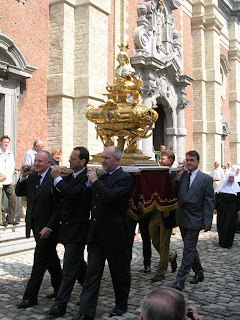





This weekend I was invited to a 'children's procession' in the béguinage of the city of Lier, Belgium. It was a walk back in time. The local community from and around the béguinage organizes every year a children's procession to celebrate the virgin Mary, which on its own sets of the festivities of the city's yearly fair. The fair will then last for 1 full month.
Only a few hundred people came to visit the procession, (I counted 4 American tourists, who clearly ended up in the béguinage by accident.) Even I had never heard about this procession while living only 25 km's from this wonderful small town. The event is an event of passion. All efforts are voluntary, although I can imagine the bearers of the catholic shrines are given beer and cheese by the church factory after the event.
With small notes in their hand people of the organizing committee try to create an event-like reality on the spot, by asking children and bearers to take certain positions on the street, to keep each other's hands, throw small colorful pieces of paper on the street with a certain grace, ask mums to accompany little daughters with fear, have spare bearers ready in the procession when shrines become too heavy etc etc... There is no rehearsal for these kind of events. Once the shrines and statutes are out of the church the event is on. Almost all visitors know somebody in the procession which results in a continuous as 'warm' perceived communication between visitors and performers.
It seems impossible to duplicate the undefinable form of cohesion between the groupmembers of the club that bears a shrine and transfer it to a workfloor environment. One shrine for example was carried by 5 members of the "Royal Brave Boat Fishers". The fact that the Club was granted to carry the "Royal" predicate means it is at least 100 years old. How many companies do we know are 100 years old ? What triggers these men to assemble once or twice a week ?





















